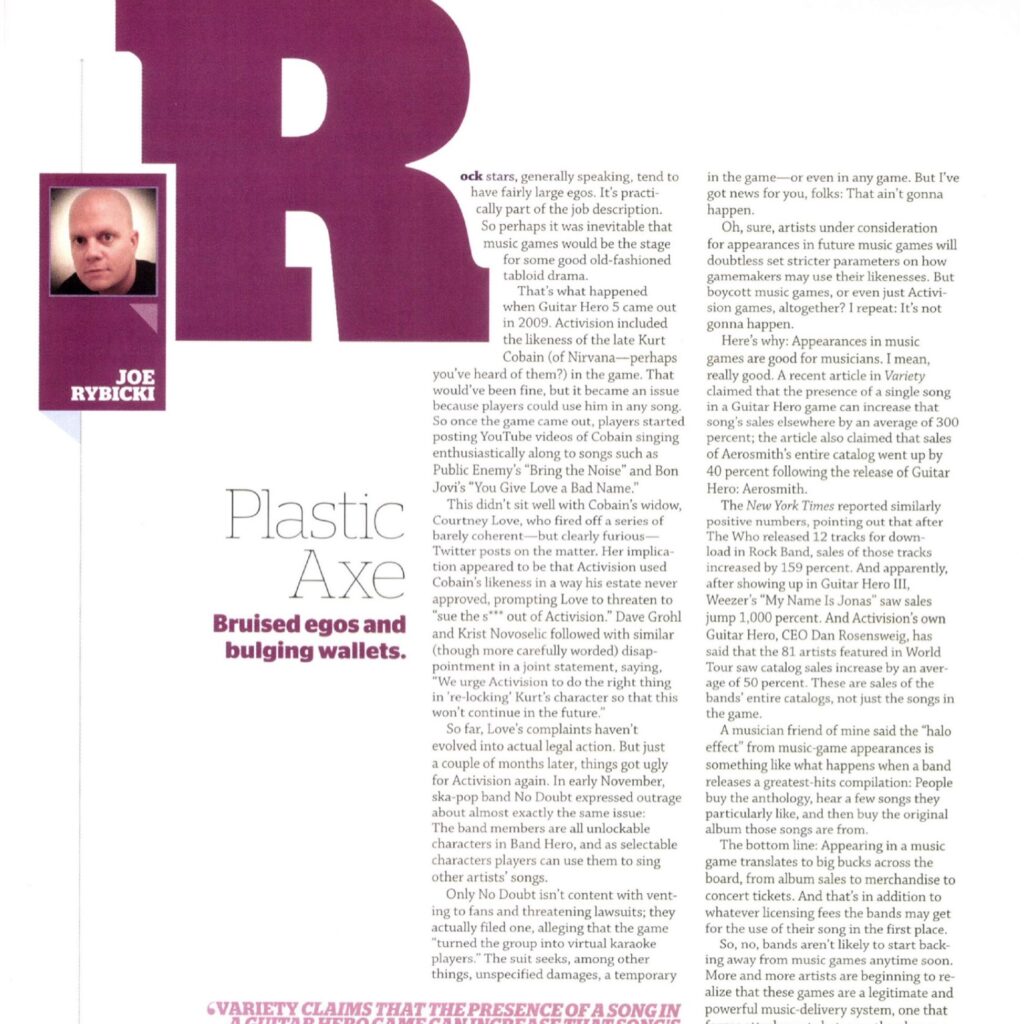
Plastic Axe: Bruised Egos and Bulging Wallets
GamePro, March 2010
Rock stars, generally speaking, tend to have fairly large egos. It’s practically part of the job description. So perhaps it was inevitable that music games would be the stage for some good old-fashioned tabloid drama.
That’s what happened when Guitar Hero 5 came out in 2009. Activision included the likeness of the late Kurt Cobain (of Nirvana—perhaps you’ve heard of them?) in the game. That would’ve been fine, but it became an issue because players could use him in any song. So once the game came out, players started posting YouTube videos of Cobain singing enthusiastically along to songs such as Public Enemy’s “Bring the Noise” and Bon Jovi’s “You Give Love a Bad Name.” This didn’t sit well with Cobain’s widow, Courtney Love, who fired off a series of barely coherent—but clearly furious—Twitter posts on the matter. Her implication appeared to be that Activision used Cobain’s likeness in a way his estate never approved, prompting Love to threaten to “sue the s*** out of Activision.” Dave Grohl and Krist Novoselic followed with similar (though more carefully worded) disappointment in a joint statement, saying, “We urge Activision to do the right thing in re-locking Kurt’s character so that this won’t continue in the future.”
So far, Love’s complaints haven’t evolved into actual legal action. But just a couple of months later, things got ugly for Activision again. In early November, ska-pop band No Doubt expressed outrage about almost exactly the same issue: The band members are all unlockable characters in Band Hero, and as selectable characters players can use them to sing other artists songs.
Only No Doubt isn’t content with venting to fans and threatening lawsuits; they actually filed one, alleging that the game “turned the group into virtual karaoke players.” The suit seeks, among other things, unspecified damages, a temporary restraining order, and the recall of existing copies of the game. As of this writing, Activision has responded with a counter-suit, seeking damages of their own due to No Doubt’s alleged refusal to support the game with promotional interviews, appearances, and such.
In other words, it’s a mess.
This sort of thing has prompted many music fans to speculate that bands would boycott Activision’s games in the future, or at the very least they would refuse to allow the publisher to use their likenesses in the game—or even in any game. But I’ve got news for you, folks: That ain’t gonna happen.
Oh, sure, artists under consideration for appearances in future music games will doubtless set stricter parameters on how gamemakers may use their likenesses. But boycott music games, or even just Activision games, altogether? I repeat: It’s not gonna happen.
Here’s why: Appearances in music games are good for musicians. I mean, really good. A recent article in Variety claimed that the presence of a single song in a Guitar Hero game can increase that song’s sales elsewhere by an average of 300 percent; the article also claimed that sales of Aerosmith’s entire catalog went up by 40 percent following the release of Guitar Hero: Aerosmith.
The New York Times reported similarly positive numbers, pointing out that after The Who released 12 tracks for download in Rock Band, sales of those tracks increased by 159 percent. And apparently, after showing up in Guitar Hero III, Weezer’s “My Name Is Jonas” saw sales jump 1,000 percent. And Activision’s own Guitar Hero, CEO Dan Rosensweig, has said that the 81 artists featured in World Tour saw catalog sales increase by an average of 50 percent. These are sales of the bands’ entire catalogs, not just the songs in the game.
A musician friend of mine said the “halo effect” from music-game appearances is something like what happens when a band releases a greatest-hits compilation: People buy the anthology, hear a few songs they particularly like, and then buy the original album those songs are from.
The bottom line: Appearing in a music game translates to big bucks across the board, from album sales to merchandise to concert tickets. And that’s in addition to whatever licensing fees the bands may get for the use of their song in the first place.
So, no, bands aren’t likely to start backing away from music games anytime soon. More and more artists are beginning to realize that these games are a legitimate and powerful music-delivery system, one that forges attachments between the player and the artists that are far stronger than what comes from more passive media.
Will bands take a closer look at their contracts in the future? You bet your sweet ass they will. But in the end, they’ll sign. They know they’d be foolish not to.
(GamePro is, alas and of course, no more, but if you wish to see this column in its original print form, please refer to the PDF.)